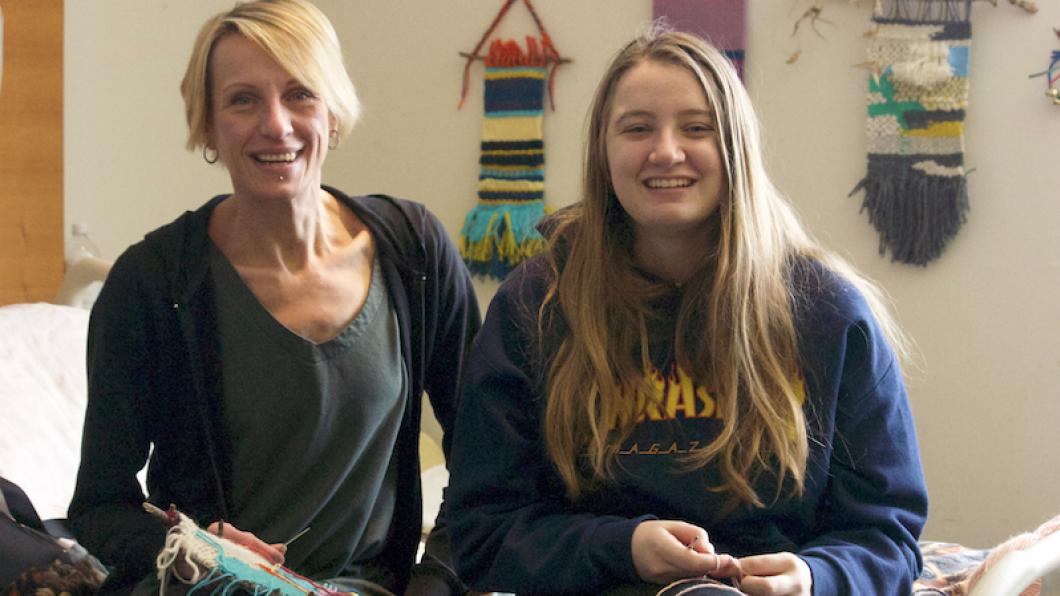
After her daughter's life-threatening aneurysm, a mother reflects on 'the amazing things that have happened'
By Louise Kinross
When Veronika Beaulieu got a call from her daughter Olympia's friend, saying Olympia had a bad headache and was vomiting, she assumed it was the flu. It was the 14-year-old's first day of high school. Veronika picked up Olympia and began to drive home. Then Olympia said: "Mom, I can't see you." Veronika drove to the ER instead. "Your daughter has had a massive brain bleed," the doctor later said, showing her a CT scan. "SickKids has a whole team waiting for her, and they're sending the Ornge air ambulance helicopter."
The doctor asked Veronika not to tell her daughter what had happened, fearing it would raise her blood pressure. So Veronika focused on the helicopter that was coming. "Olympia was in the process of getting her pilot's licence. She's always wanted to fly."
Olympia was hospitalized for three weeks. Two months later she underwent a 12-hour surgery to "remove a cluster of blood vessels and veins that were tangled up," Veronika says. When she arrived at Holland Bloorview for rehab, she had no peripheral vision in both eyes, had left-sided weakness and struggled with balance and auditory memory.
"The hardest part for me is just the fear and wanting her to be okay," Veronika says. "But at the same time, it's easier for me to focus on all the amazing things that have happened. Just today Olympia said: 'Mom, is it crazy to think that I'm glad this happened? I'm not glad I had an aneurysm, or that it ruptured, or that I had surgery.' But she's made lots of friends here at Holland Bloorview. There are a lot of teenagers here, and she's really grateful for the connections and she realizes she wouldn't have made those if she weren't here. I love that she's looking at it that way."
Veronika says the practical and emotional support she's had from other parents on the unit has been key to her own ability to cope. "Meeting the families, for me, has been so helpful. There's a comfort in connecting with someone who can understand. I'll tell a parent 'I'm worried,' and they'll go 'Yeah, I get it,' and they do. Hearing all of their stories, and some are horrific, brought the opposite of what I thought it would. Instead of saying 'Oh my gosh, I'm horrified to live life,' I realize that anything can happen, at any point. Whether you bubble-wrap your kids and don't allow them to do certain activities, we really don't have control, and there's a bit of freedom in that. It's given me a calmness. It made me feel: 'Go and live your life, go and live your life!' It's not about being happy all the time, and it's not about not having hardships. It's about it being life. You need pain and joy to appreciate both, and there is beauty in both."
Veronika says she's also benefited from a weekly caregiver support group for parents of children with brain injury and from counselling with a social worker. "I'm that kind of person who needs to talk in order to realize how I feel."
Veronika says she's grateful for how her daughter has been included in her health care. "Here, and at SickKids, she was always included in the decision-making. They cared about what she thought, and her opinions were really important. "
Being an inpatient during COVID-19 has meant tough restrictions. Olympia's dad and siblings see her when she goes home on the weekend to their farm in Port Hope. Something that's helped Veronika and Olympia deal with stress is crocheting. "I love making things, that's what I do," Veronika says, pointing to colourful weaved hangings that decorate Olympia's room. Some incorporate sticks she picked up during their walks in Spiral Garden behind the hospital.
Veronika has a unique connection to Holland Bloorview. Her father, Jerzy Antczak, was an engineer who worked for 30 years in our communication and writing aids team, designing systems that allow someone with physical disability to control the lights and appliances in a home. "I remember coming home as a teenager, and I wanted to turn on a light with a switch, and my dad wanted me to say "Light on in bathroom' instead, because he was testing his devices. That gave me some perspective."
Leaving Holland Bloorview will be bittersweet. "Here, people understand her issues, even though they're invisible. It will be different when we leave this bubble for the bigger world. There will be a lot of learning curves and ways we'll need to self-advocate. Here, that support is just built in."